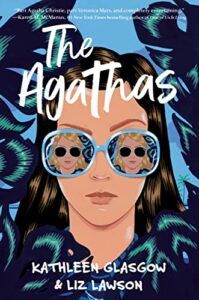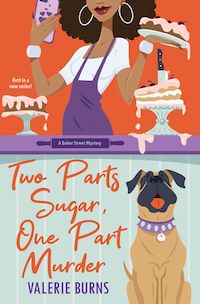
This content contains affiliate links. When you buy through these links, we may earn an affiliate commission.
These past few years have been good for fans of crime fiction and nonfiction. Lots of new names and voices are being published in the murder mystery world and podcast world, with television and movies following suit. However, as a mystery reader, I’ve shied away from a lot of the true crime. Initially, it was because I associated the genre with serial killers, which I just don’t like in any format, fiction or nonfiction, but I acknowledge that the genre has really expanded in many directions these days.
Interestingly, I asked Book Rioters this question and got these responses back to back:
Ashley Holstrom: “I read true crime but am not a big mystery fan! Not that I don’t like mysteries, but they’re not what I gravitate toward. I might be your outlier here.”
CJ Connor: “I’m the other way around. Love mysteries but don’t like true crime. Again could be an outlier. (Incidentally, Connor’s cozy Board to Death comes out next year and I can’t wait!)”
I hadn’t thought much about true crime versus murder mysteries until I was having a similar conversation over and over again this year. I’d mention that I love mysteries but not so much crime. People responded typically agreeing with me or saying that they preferred true crime. I decided to ask readers and writers about what draws them to one genre over the other or both. I found some interesting overlaps in responses.
Unusual Suspects Newsletter
Sign up to Unusual Suspects to receive news and recommendations for mystery/thriller readers.
Thank you for signing up! Keep an eye on your inbox.
By signing up you agree to our terms of use
I conducted a survey and interviewed several authors that I know. The survey responses weren’t conclusive, but the reasons that people were drawn to one genre over another were fascinating.
True Crime
Dark Side of Human Nature
True crime aficionados liked the deep dive into the psychology of it all. Jack El-Hai, a true crime writer who recently published The Lost Brothers, wrote, “I’m only an occasional reader of murder mysteries. Many fictional works about murder are about finding out who did it, and the narrative concludes with that discovery or with catching the perpetrator. I’m more interested in why they did it and the aftermath for everyone affected by the crime.”
Kathleen Glasgow, co-author of The Agathas as well as YA fiction, said in an interview earlier this year that she was drawn to true crime. With those books, she wondered “why do people do bad things? And how do they do them? And why did they keep doing them?” However, she also reads mysteries, though tends towards thriller/crime fiction: mysteries with an edge.
Expanding One’s Own Education
Another theme that came up was people liked the expertise around it. Book Rioter Eileen Gonzalez responded to the survey saying she read both genres and said that she preferred nonfiction to fiction in general. “I think it can be just as exciting as fiction, plus I get to learn things about history, which is always fun! I guess it’s also because I feel less bad if I can’t solve the crime before the end in a nonfiction book: I am not attentive enough to put the clues together in fictional murder mysteries!”
Valerie Burns, a writer of several cozy mystery series including the new series Baker Street Mysteries, said while she tended not to read true crime, “sometimes I watch True Crime on the ID Channel. I get ideas about forensics, police procedures, etc. that can help in my fiction writing. However, I usually only watch a small amount of it.”
Another respondent said, “I don’t actually enjoy suspense but I find crime and criminal law interesting.”
Janis Thornton, writer of true crime books like Too Good a Girl and other murder mysteries, said: “I am a big fan of decades-old, little-known and long-forgotten historic true crime stories (primarily involving murder). I love history and mystery, and that fuels my passion for digging up these stories, researching them, and retelling them in my own voice.”
Ellen Byron, author of several cozy mysteries including the new Vintage Cookbook series, said, “I definitely read crime fiction these days, mostly because I’m trying to keep up with my friends who write it! But I am fascinated by older true crime mysteries.”
Murder Mysteries
Putting Together the Puzzle Pieces
One person who read murder mysteries exclusively said, “Murder mysteries are a chance to peek into other lives and try to be clever, whereas true crime is reading a real tragedy and that just upsets me.”
Thornton said about mysteries, “I love reading stories that draw me in, get me involved in a mysterious situation, and require me to pay attention so I can solve the mystery before the author tells me.”
One respondent who liked both genres also agreed: “It’s about the puzzle of human nature. In true crime you really can delve into the reality of it. With murder mysteries you see how much we understand it and can recreate it on paper.”
Justice, Justice, Justice
For many mystery writers, they appreciated the satisfaction that mysteries provide. At the end, you usually learned whodunnit. Burns said it best: “JUSTICE PREVAILS in the end. That’s not always true in real life.” With true crime, the perpetrator may not even be found, much less brought to justice for their crimes.
Olivia Blacke, author of the forthcoming Vinyl Resting Place, explains, “In a cozy, the person who’s killed is usually a pretty bad person. In the end, it’s going to be wrapped up neatly, the killer is gonna get caught. The killer might have even had the best intentions; the killer can sometimes be a better person than the victim.”
Real People, Real Pain
One theme that came up was people’s discomfort that real people were hurt in true crime. This came up repeatedly in conversations with folks on the topic. Burns summed it up best: “I think there’s a part of my brain that registers the fact that this is real. These bad things actually happened to real people, and that makes me sad. With fiction, I know it’s not real, and because I write cozy mysteries, there are no graphic depictions of crime.”
One respondent who prefers mysteries wrote, “I am concerned about the possibility of harming the people involved in the true events, just to create a story.”
Thornton also explained, “But in my view, the two genres aren’t really related. One is brutal, heartbreaking reality; the other is make-believe and allows readers to enjoy the story without feeling guilty about it.”
Blacke summed it up: “if you don’t want to be confronted with getting up in the middle of the night and checking your locks three times, then you probably don’t want to be reading true crime.”
The Parlor Room
Now that I have brought together all the suspects (opinions), I will let you know what I think I can infer from these queries. While by no means a scientific study, I think that murder mystery readers tend to prefer the genre only, but there’s a decent showing of folks who will read both. Interestingly, authors don’t limit themselves to one genre over another. I think there are several reasons, including that authors want to stay current in crime as well as reading their colleagues’ books. Or they just enjoy it!
Blacke summed it up best: “I think it has to do with why somebody is reading. If they’re the kind of person who will just flip through Netflix and go, ‘Okay, this looks interesting.’ And just watch it. That’s how I am in bookstores, I just like, ‘Oh, that’s a pretty cover’ and start flipping through it. The next thing you know, I’m reading this book that I’ve never heard about. And there’s some people that want [to know specific things like whether] the dog makes it through to the end. They don’t have to think about blood.”
Whatever the reason you read true crime and/or mystery, it is legitimate. Enjoy your books and don’t let anyone yuck on your yum!
For folks who want cozy mysteries, here’s one Rioter’s list of cozies that take place in libraries! For fans of true crime, here’s some suggestions of true crime audiobooks to check out!



